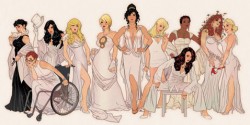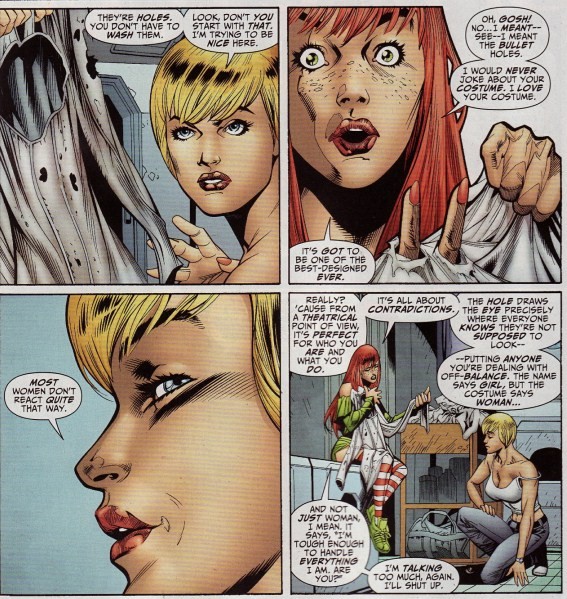
Women as Victims in Comics, Movies, and Books
June 29th, 2010 Posted by Esther Inglis-ArkellThis is a difficult entry for me to word, because a supposition has been set down by feminists about why women are portrayed as victims, and I don’t disagree with it. Not one bit. At the same time, I have some thoughts that I hope will broaden the understanding of why women are the victims in fiction, but that I think could also be used as an excuse. So I’m trying to make my point clear, without any confusion.
It’s pretty obvious that in fiction, especially in horror or action genre’s, women are sent in to be captured, to scream and be horrified, to look pitiful when they’re being used as a bargaining chip, and in many cases to die. They’re the victims who wring the most drama from the situation, and they engage the audience’s sympathy more than men do when they’re put in peril. Some people argue that this decision to endanger women shows that women are considered more valuable than men. If a guy’s life is on the line, the audience doesn’t care as much. That argument never worked for me. If a female character’s most valuable when being a hung over an abyss, female characters aren’t in a good position. The feminist argument is that women are most often put in the action genre to be prizes and plot points, and because there is something in people that thrills to see women in danger.
Like I said, I don’t disagree with that.
I think, however, that women in danger is compelling because of the way that those women can behave. Any horror movie trailer will include the blood-curdling shrieks of women. They’ll scream, cry, beg for their lives. They’ll whimper when they’re afraid. They’ll rock back and forth in shock. They’ll go through a massive range of emotions.
And, more often than not, at the end of that horror movie, the woman will pull herself together, beat the hell out of the villain, and walk away. (There are exceptions. Some modern horror movies like to kill off everyone, but they suck. They do.)
Men in horror movies, or action movies, or comics, or fiction, don’t tend to do the same. Don’t get me wrong. I think that actual men in danger would react every bit as emotionally as women do. No one’s whimper-proof. It’s just that audiences don’t accept it the same way that they do women.
A woman can be a screaming, quivering wreck and still be tough as nails a few scenes later. If a man does the same thing, shrieking and begging and going to pieces, its rare that his character is given the same respect, even if he does overcome his weaknesses and become the hero. Women are given the full range of human emotion. Men are tough guy stereotypes. It’s no wonder that women in peril are more interesting to watch.
I’ve always thought that what modern men need most is a ‘women’s movement’ of their own. The women’s movement made it acceptable for women to not only retain the ‘feminine’ traits that they were always allowed to express, but also pick up any and all masculine traits as well. They can grovel in the dirt *and* grind their enemies into the dust. Men, on the other hand, have relatively circumscribed behavior. Although they do tend to have more power, and get more respect, when they show masculine emotions, when they step away from traditionally masculine traits, they get a tidal wave of disapproval. It’s an effective carrot and stick strategy, and unless there’s a line of defense for men who men who step outside the masculine sphere, it will continue to limit men’s behavior both in fiction and in life.
Before anyone says that the continued use of women as victims is some kind of sign of female empowerment, or of female dominance, lets remember one more time what we’re talking about. Screaming, begging, weeping, shaking, and breaking down are signs of weakness. There’s no question that they’re understandable, but comic books and action movies are power fantasies. Like women being ‘valued’ as long as they’re being threatened, women having the freedom to be weak is a sign of the social order. I remember a few years ago, Marvel published a comic in which a female hero was brutalized on camera, for the entertainment of a bunch of villains. The woman screamed and fought ineffectually, and the film ended to general approval. Marvel said that the comic was intended to be horrifying and to sicken the readers, not to glorify female suffering. I believe that that was true.
I also believe that Captain America wouldn’t be in a scene like that. Or Tony Stark. They might be beat up on camera, but they wouldn’t be in a scene like *that*. Screaming, begging, weeping, coming apart, being beaten down as they try to fight – this is not something male heroes do. At least, not male heroes who will continue to be marketable. Yes, in general women get a fuller range of expression, but it’s important to remember that they get that range of expression in order to be allowed to behave in ways that would be too degrading, humiliating, and ruinous for male characters. Being skewered on a hook to tug the audience’s heartstrings is not a sign of social equality. Especially not when they’re alone out there.


